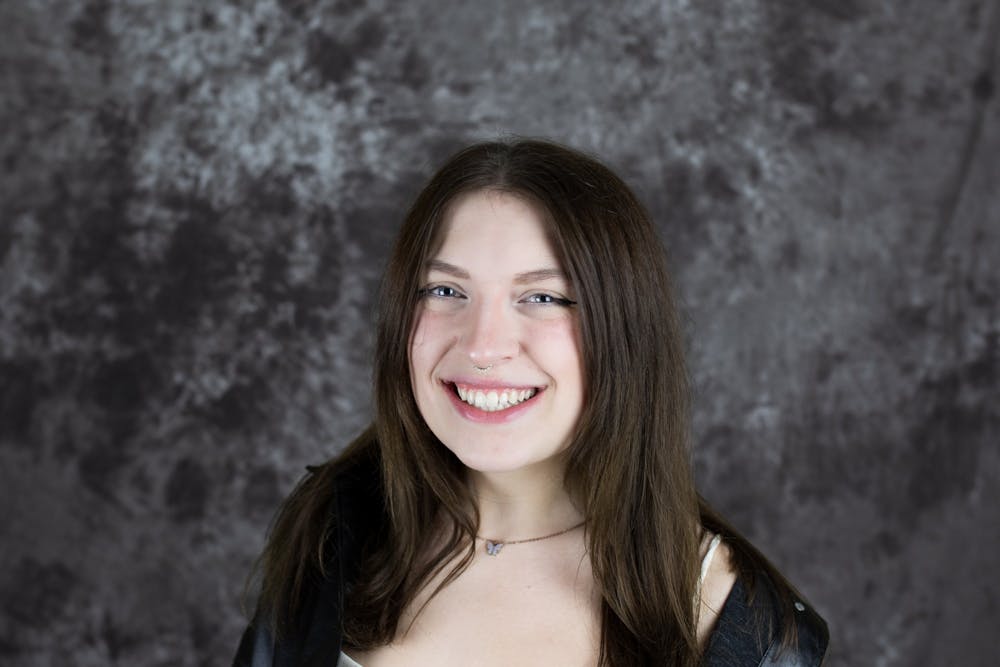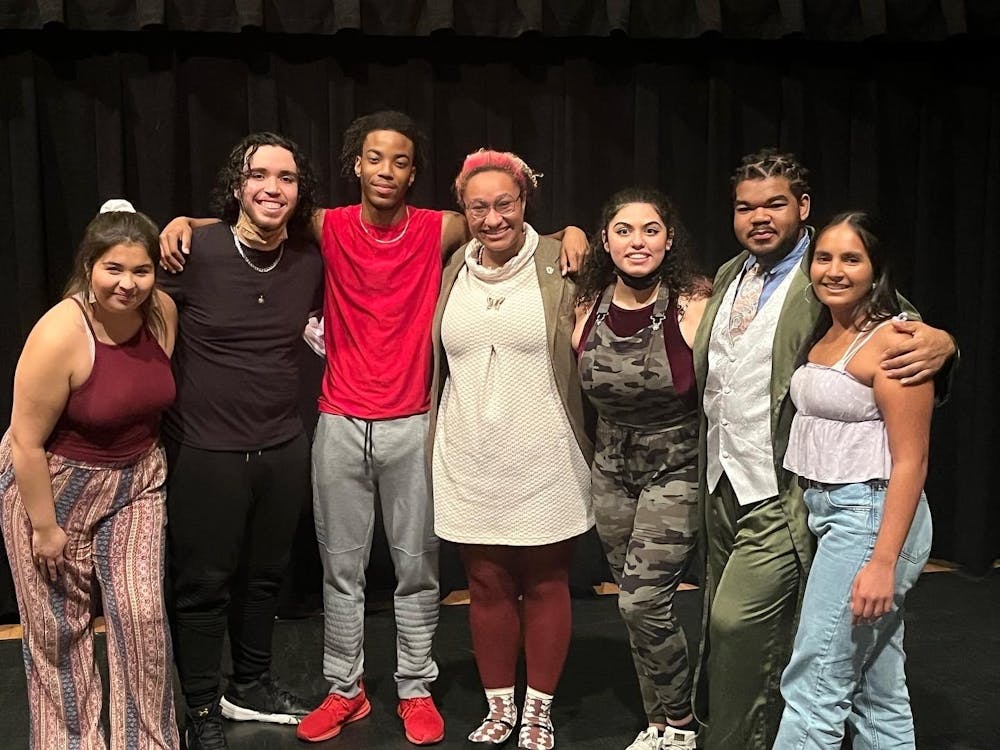In the spring semester of his freshman year, David Eve found himself returning from a callback “sobbing his little heart out.”
It wasn’t because he forgot his lines; he didn’t.
It wasn’t because he botched his audition; he didn’t.
Personal failure was not at the root of his sadness.
Rather, it was the reality of being a Black individual in UB’s Theater and Dance Department that caused the heartache.
Eve was auditioning for the spring 2020 production of “Merrily We Roll Along.”
However, unlike his white counterparts, Eve says he was “pigeonholed” into auditioning for the role of the minister, a character who is subject to a joke regarding his Blackness.
“You put in the same work for the audition as everyone else. You put in the same work at the callback as everyone else,” Eve, a junior music theatre major, told The Spectrum in an interview. “And then, suddenly, there’s just this one role and this one scene that comes up and it’s stopping you completely from getting anything more.”
The lack of roles for students of color is just one issue UB’s theatre and dance department has been forced to confront over the past years. From hairstylists who won’t or can’t do students of colors’ hair to microaggressions spoken by professors and peers alike — the performing arts has not been the safest place for UB’s students of color.
Dreams Affirmed is working to change that.
Dreams Affirmed is UB’s first student-run diversity club that focuses on creating safe spaces, fighting against inequality and promoting opportunities for students of color in the performing arts. Founded in September 2020, Dreams Affirmed was recognized as a formal club by the Student Association in December 2021.
The club initially started as an informal group of students, bonded together by shared experiences of exclusion and frustration.
The space they built together was intended to do the opposite — it fostered a self-described family, one of joy, security and accomplishment.
“I think there’s sort of this kinship that comes from feeling like these people get you on so many different levels,” Tioga Simpson-Worthington, a junior theatre major, said. “It’s just really a very beautiful space.”
As the group solidified into a more formal organization, their influence on UB’s performing arts grew.
Dreams Affirmed reached a turning point in recognition from students and staff after its Spring 2021 production of “Pipeline.” The play, which focuses on the story of a Black inner-city school teacher, Nya, and her son, Omari, was produced with nearly an entire cast and crew composed of students of color.
“Pipeline” resonated with Dreams Affirmed members for two major reasons: it was a story written consciously about the lives of people of color and it demonstrated to UB’s theatre and dance department that such stories have a place on their stages.
“That was when everyone was like, ‘Not only are these people trying to tear down some of the structural issues of the department, they’re also producing high-quality work,’” Derrian Brown, a junior music theatre major and Dreams Affirmed’s event coordinator, said.
Some members of Dreams Affirmed say that much of “Pipeline’s” success would not have been achievable had faculty been involved.
Members believe that part of this lack of trust comes from divided interests between faculty and students: faculty may be more concerned with budget and timeliness, whereas students may prioritize their own wants and freedoms as actors.
However, a larger root of this issue is the lack of faculty of color in the theatre and dance department.
The issue of entirely or primarily white faculty has been one that Dreams Affirmed members have faced throughout their undergraduate careers, and one that they are continuously trying to amend.
“I want to work with a voice teacher who really understands my voice,” Eve said. “I would love to work with an actor who really understands my experiences.”
The lack of faculty of color has caused feelings of isolation, instances of racial insensitivity and even difficulty completing homework.
Dreams Affirmed vice president and senior musical theater major Kristen-Marie Lopez recounted casting type assignments where students were tasked with finding songs sung by an actor that looked like them — rather than songs that fit their voice or their musical style.
“I’m kind of getting stuck in this Latina stereotype,” Lopez said. “Every time there is a Latina character that I look like or sound like, I’m just portraying the stereotypical character.”
As a result of these issues, Dreams Affirmed, then a self-titled collective, organized a talkback with the theatre and dance faculty in December 2020, the semester before “Pipeline’s” production.
Members say the conversation produced a mix of feedback from faculty — much of which they say was positive.
“I think a lot of faculty members felt upset and a couple reached out to me and apologized and said that they want to do better,” Sydné Jackson, a senior theatre performance major and Dreams Affirmed president, said. “Some professors, I could tell by the look on their faces, weren’t feeling it.”
Despite lingering problems in the department — and the world of theater as a whole — and lukewarm responses from certain professors, the mere existence of Dreams Affirmed has been a point of confidence and support for its members.
“I just had a class where I told the teacher that we will not be talking about minstrels,” Simpson-Worthington said. “I do not want to talk about blackface. I don’t want to talk about Turkey in the Straw. I don’t want to talk about any of it.”
Simpson-Worthington says having the support of Dreams Affirmed members gave them the courage to speak up in class that day and, as a result, that lesson and future lessons surrounding these branches of racist theatre came to a stop.
More than just providing students with the platform and bravery to speak out and have their voices heard, Dreams Affirmed also acts as a respite for students of color who grow weary in their fight for racial sensitivity and inclusivity.
“There are times where we, as human beings, don’t feel strong. We don’t have the resilience, that grit, to fight sometimes,” Eve said. “To find a group of people where you’re like, ‘Hey, my armor is a bit down today,’ and they can lift you back up to where you need to be to go out and fight and make that change.”
In their collective fight, Dreams Affirmed members remain especially proud of recent achievements including the creation of an anonymous reporting system for the theatre and dance department and the hiring of guest speakers.
The reporting system, made through Google Forms, allows students to report any incident in which a faculty member or peer made them uncomfortable in any form (including on the basis of race or gender and sexuality).
Dreams Affirmed members are mandated reporters for incidents that violate university law, but they hope the system allows smaller, but still important, instances to be brought to light, such as those of microaggressions.
“We should not have to wait until the hate crime-level to report something,” Lopez said.
As of her interview with The Spectrum on March 18, Jackson says no instances have been reported through the system.
The introduction of guest speakers, particularly those of color, has been another highlight of the changes Dreams Affirmed continues to seek. With a lack of faculty of color, members have cited the guest speakers as bringing in cultural nuance that had previously been lacking in the theatre and dance department.
Now, as the semester nears its end, Dreams Affirmed members say they look forward to putting on a showcase near the end of May.
The showcase, described as a “Broadway backwards” by Lopez, has been one of Dreams Affirmed’s goals since last fall. The aim of the showcase is to allow students (from any discipline) to perform roles that would traditionally be unavailable to them due to race, gender or any other reason.
“We’re such a talented group of people,” Lopez said. “To see us limitless is really going to impress a lot of people who might have thought that we couldn’t do things or that we get opportunities because of the way we look.”
Kara Anderson is a senior arts editor and can be reached at kara.anderson@ubspectrum.com

Kara Anderson is a senior arts editor at The Spectrum. She is an English and Spanish double major and is pursuing a certificate in creative writing. She enjoys baking chocolate chip cookies, procrastinating with solitaire and binging reality TV on the weekends.





